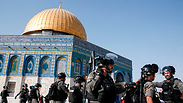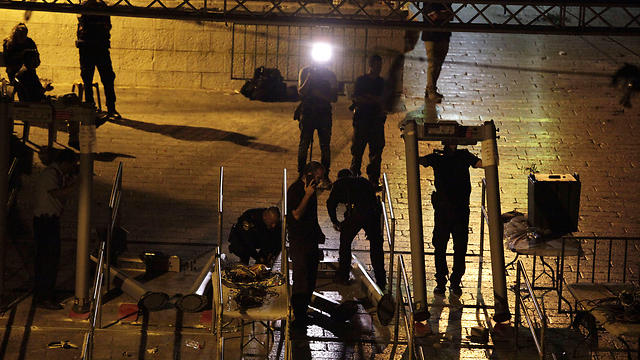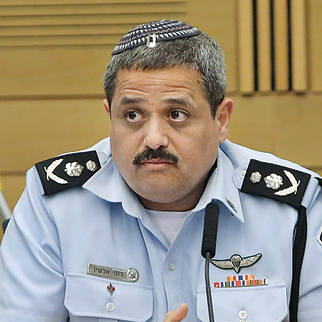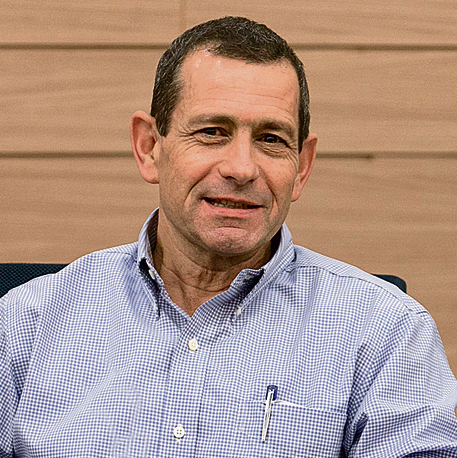
Behind the scenes of a resounding Israeli failure
Analysis: While the police considered the metal detectors a temporary solution ahead of an improved security system, the IDF objected to any change at the Temple Mount, including cameras; cabinet members were asked to sign a confidentiality agreement, but an hour later, everything had already been leaked; and Israel’s main lesson from the affair is that it mustn’t rely on the current US administration in the next big crisis either.
Meanwhile, the diplomatic failure cannot be ignored: The Israeli Embassy in Jordan has been evacuated, the Egyptians have cancelled the Egyptian Independence Day celebrations in Israel, Turkish President Recep Tayyip Erdogan has violated the reconciliation agreement and Israel is afraid to claim the price lest he decides to come to the Temple Mount himself, and Palestinian President Mahmoud Abbas has been pushed into a corner and has become oppositional regarding everything that has to do with the current crisis. If that isn’t a failure, what is?

In the last cabinet meeting on Monday night, when it was decided to remove the famous metal detectors, all those present were asked to sign a confidentiality agreement. There was no chance it would work. Less than half an hour after the end of the meeting, everything had already been leaked, and not by chance. The cabinet members are sensing that Prime Minister Benjamin Netanyahu will soon start looking for scapegoats.
The Temple Mount crisis is not the security official’s failure. It’s the failure of a weak and hesitant political echelon, which should have directed the police, the army and the Shin Bet and provided the political envelope for the aggressive moves on the ground.
In that meeting, Police Commissioner Roni Alsheikh presented the police’s planned security perception, and Military Intelligence Directorate chief Herzl Halevy presented the IDF’s evaluations of the situation. There is no unanimity between the army and the police, and that’s a good thing. Nevertheless, as the national police headquarters and the General Staff see it, leaking the security plans and revealing the disagreements between the police on the one hand and the army and Shin Bet on the other hand add fuel to the fire at the Temple Mount. They make the Waqf and its supporters—from Qatar through Turkey to the Palestinian Authority—fight and raise the price.
The professional, legitimate arguments within the defense establishment focused, first of all, on a fundamental question: Is there room, after the murder of the two policemen at the Temple Mount, to make a change that could move the region, even by an inch, towards a religious conflict with the Muslim world. In the Israeli security outlook, the Temple Mount was and remains the most explosive place in the region, which could lead not only to an outburst of religious fanaticism, but also to an overall regional conflict and to the loss of strategic assets. The leaked arguments over the metal detectors were a smoke screen. Everyone—the army, the Shin Bet, the police and definitely the cabinet—had an interest in downplaying the decision and presenting it solely as a tactical matter.
Only last Tuesday, four whole days after the terrible attack at the Temple Mount, the army was asked—for the first time officially—for its opinion on changing the security arrangements at the Temple Mount. The IDF presented a fundamental stance: The status-quo at the site must not be changed. This mantra, which is supported by the Shin Bet as well, has been repeating itself in every discussion since then: No metal detectors, no cameras and no scaffoldings with different inspection sensors on them over the nine crossings into the Temple Mount. Everything that has been installed should be removed.
Smart cameras, too smart
Police chief Alsheikh can definitely see himself as an expert on Palestinian issues and on the Temple Mount. He is as big an expert, if not more, as any of his colleagues at the Shin Bet and IDF. As a former Jerusalem district commander at the Shin Bet, he knows every corner there and all those involved, and unlike some of his colleagues who run the other organizations, he knows Palestinians not just through the rifle sight. Thousands of Palestinians sat in front of him in the interrogation room, he has perfect knowledge of the culture and the language.
But when he decided to recommend the erection of metal detectors at the Temple Mount, in the weekend following the murder of Staff Sgt. Maj. Ha'il Satawi and Staff Sgt. Maj. Kamil Shnaan, Alsheikh likely wasn’t acting like a policeman. He came from to the police from the organizational culture of the Shin Bet, and so did his associations on traumas and the way to deal with crises. As far as he’s concerned, the moment two policemen were murdered by Arabs who smuggled weapons into the Temple Mount and acted from within the site, a red line had been crossed in terms of security and there is no way back.

When Shin Bet officials talk about a red line being crossed in security, they are mainly referring to Prime Minister Yitzhak Rabin’s murder by a Jew. The main assessments in light of the threats on Rabin pointed to the Arab side. The emergence of a Jewish murderer was considered, but it wasn’t perceived as a realistic option, until it happened. That’s probably what crossed Alsheikh’s mind when Israeli Arab terrorists arrived at the Temple Mount with firearms. While the police had focused on the possibility of Jews committing terror attacks and provocations on the Temple Mount, Arab terrorism from the mountain wasn’t seen perceived as a real threat, even if it did appear in the scenarios. Like in the Rabin murder, but the other way around.
As soon as this red line was crossed, Police Commissioner Alsheikh saw before his eyes an ISIS loyalist entering the Temple Mount and shooting Jews, tourists and police officers. As far as he’s concerned, that’s a scenario Israel must now prepare for.
The original intention in the ministers’ consultations with the heads of the defense establishment, immediately after the two policemen were killed, was to lock the mountain for a week. The metal detectors option was raised, but they weren’t perceived as a key issue, as there was a feeling that there was a week to sit, discuss, calm the situation down on the ground and hold diplomatic talks. Eventually, in light of the protests around the world over the precedent of closing the Temple Mount for a long period of time, it was decided to open it as early as Sunday, and the metal detectors became a hit as the only means available to try to deal with the scenario the police chief and his people were preparing for: The entry of armed Muslims to the Temple Mount.
And so on Saturday evening, two weeks ago, the prime minister held the famous conference call in which he gave the green light for placing the metal detectors and opening the Temple Mount, a moment before boarding a plane for an official visit abroad. The Shin Bet and the IDF were not required to voice their opinion at this moment, which seemed like a technical stage. In retrospect, military officials were even surprised by the police’s efficiency in organizing 11 metal detectors overnight to greet Sunday’s worshippers.
The Jerusalem District Police saw the metal detector as a temporary, partial response to begin with, which wouldn’t be able to provide a good solution for the passage of tens of thousands of people in the rain and under other restrictions. The metal detectors were perceived as an initial response until the police would fulfill their wild dream: To install an advanced security system around the Temple Mount, which would make it possible to locate suspects even before their arrival at the entrances around the mountain. These secret measures are the cutting edge of global security technology: Underground metal detectors, far away from the Temple Mount, cameras which would send data to computers that would quickly locate suspects and unusual activity, etc. From all this Temple Mount mess, the police got one good thing at least: They received a budgetary approval in principle for tens of millions of shekels to develop the systems.
A few smart cameras were installed as part of a police pilot about a year ago. Had these cameras been activated now, it might have been possible to locate one or two of the terrorists, radical Islamist activists from Umm al-Fahm, whose names were in the Israel Police and Shin Bet’s database and who carried out the attack at the mountain two weeks ago. By the way, 29-year-old terrorist Muhammad Jabarin, the muezzin at the al-Farouq mosque in Umm al-Fahm, was stopped by a policeman before entering the Temple Mount on the morning of the attack and was asked to present documents. He didn’t raise any suspicions, however, because the weapons had been smuggled by an accomplice of the cell who intentionally looked sickly.
The problem is that even if those cameras had been installed around the Temple Mount the next day—and they weren’t, in light of the Jordanians’ strong refusal—this isn’t a system that can provide a response within days, or even within weeks. The metal detectors are a stupid and effective tool, while smart systems need a learning and adjustment period. The computer behind the camera learns all the time.
Sacred Honolulu vacation
At the time of the decision to place the metal detectors, there was no sense of urgency in the political echelon. The ministers didn’t identify the explosive potential. The prime minister went abroad as planned, Jordan’s King Abdullah was on vacation in the United States, and Palestinian President Mahmoud Abbas was in China. The White House wasn’t involved. Netanyahu hadn’t tied any loose ends yet. The discussions with the Jordanians focused on the Israeli demand that Amman would use its influence on the Waqf people who receive their paychecks from Jordan. The Jordanians, in response, demanded that Israel remove the metal detectors.
Until last Sunday, the White House addressed the Temple Mount events as something which should be handled by its embassies in the region. The problem is that both the US ambassador to Jordan and the US ambassador to Israel are new. Moreover, the White House office dealing with Middle Eastern affairs, as most offices in the State Department, is still unmanned. The State Department and the White House—two systems which were well-oiled until recently and knew how to deal with crises around the world—are simply not functioning under Secretary of State Rex Tillerson and President Donald Trump. Netanyahu, on his part, didn’t feel the need and didn’t want to get the Americans involved, so as not to turn the event into an international saga.
As a result, the Americans came into the picture at a much later stage, with the Amman embassy shooting affair. Shabbat also played a considerable part here. Not only is the White House not functioning very well and lacking any proper work systems, but three senior officials—American Ambassador to Israel David Friedman, the president’s son-in-law and close advisor, Jared Kushner, and the special representative for international negotiations, Jason Greenblatt—are religious Jews who observe Shabbat. They were all on their weekend break until Monday, and the White House’s operations room didn’t bother getting them involved.

It was only on Sunday that Israeli Ambassador to the US Ron Dermer found his personal friend Kushner and asked him to talk to the Jordanian king, who was vacationing in Hawaii. Kushner took care of the request himself, but it’s hard to say that Israel had his full attention: During that weekend, the president’s son-in-law was busy preparing for his dramatic testimony to the Senate on Monday, following heavy suspicions that he had made contact with Russia before the presidential elections.
Greenblatt left for the region that same day, with no plan in his pocket apart from a basic agreement between Netanyahu and the king: The security guard would be returned to Israel in exchange for an Israeli concession that would ease the tensions at the Temple Mount. When Greenblatt boarded the plane, he thought he would arrive in Jordan, get the security guard out and move him to the American embassy—where he would be questioned by Jordanian security officials—and then return with him and with the embassy staff to Israel, and the US would receive Netanyahu’s gratitude. Moreover, he had already began contemplating an organized procedure for the future handling of crises with American involvement, which Israel, Jordan and the Palestinians would all be part of. Nothing of the kind happened. King Abdullah disrupted all the plans. The inexperienced Americans failed to coordinate their plans with him, and he had no intention of ruining his vacation.
The king already had a recommendation from the head of his security services on the table. The latter had met on Monday with Shin Bet Director Nadav Argaman, who travelled to Amman to personally handle the security guard’s release from the embassy building. Argaman and his Jordanian counterpart tailored the required arrangements to end the crisis, including an agreement that the Jordanian authorities would question the security guard at the embassy before his departure. The praise Netanyahu showered Trump with gives the American president a bit more credit than he deserves.
Israel’s main lesson from this affair is that it mustn’t rely on the current US administration in the next big crisis either. While it wants to help, it’s still unable to.
The key is in Abdullah’s pocket
The Temple Mount attack caught the Israel Police at a time when it seemed as if they would be able—together with the other security forces—to restore normalization at the Temple Mount and uproot the potential for incitement from the site after 18 difficult months. This process included arrests of Islamic Movement members, outlawing the Islamic Movement and the "Mourabitoun,” and expelling radical Waqf members from the mountain, with Jordan’s help.
While the Palestinian Authority prevented an Israeli-Jordanian agreement to install cameras on the Temple Mount two years ago, the parties found a way to use measures that would make it possible to reasonably monitor the situation at the site. The Waqf people knew about it and ignored it. The police believed they were back on track.
Paradoxically, the three terrorists from the Temple Mount are, according to the police and Shin Bet’s perception, a product of the successful reduction in violence around the Temple Mount. According to the working premise, as soon as the Islamic Movement’s open activity is stopped, some of the steam is let off through terrorism, which is why a terrorist cell around a dominant figure in an Israeli mosque shouldn’t have been a big surprise.

In cabinet discussions and in evaluations of the situation within the security bodies, on the eve of the metal detectors’ erection, the police chief estimated that there would be riots and resistance on the Arab side to the change in the security measures. The issue wasn’t brought to the Palestinians' attention, and the swift decision wasn’t shared with the Jordanians either.
At the time, the police had rejected all the scenarios provided by the other security bodies, which talked about worshippers storming the metal detectors or forcibly breaking into the Temple Mount. Nevertheless, in order to deal with such a possibility, the police raised their alertness to the highest level and recruited several thousand police officers in the Jerusalem area, to create a mass in every point of protest for deterrence and dispersal purposes. They didn’t put out the fire, but they didn’t let it spread inside the city either. The army recruited five regiments and prepared for “reinforced security” to deal with acts of terror.
Friday, July 21st, was the first test. The army and the police succeeded in putting out small fires, on the tactical level. After three Palestinians were killed, the police removed themselves from the points of friction to reduce the number of casualties, and allowed the Palestinians run wild—as long as they stayed away of the Temple Mount and central Jerusalem. At this point, it was clear to everyone that the battle wasn’t over metal detectors but over sovereignty. As far as the Palestinians are concerned, this was a calculated Israeli move aimed at dividing the Temple Mount between Jews and Arabs like the Cave of the Patriarchs in Hebron. Until this very day, the Waqf won’t forgive itself for agreeing to divide the site’s management with Israel.
Throughout the entire day, there was a feeling in the joint operations room of the army, the Shin Bet and the police in Jerusalem that there had been a drop in the motivation for violence. The Palestinian public, officials estimated, saw the Arab world intervening and pushing for an end to the crisis. The army removed two regiments. And then the Halamish massacre took place, and the army returned three regiments. At the moment, the volume of the IDF’s forces in the West Bank is similar to its volume on October 2015, when the knife intifada broke out.
Paradoxically, the state of affairs on the Palestinian street after the murder of the three Salomon family members points to a satisfied feeling of revenge, to a bloody account that has been settled. Israel believes, therefore, that the situation can be calmed down from this point. It shouldn’t be indifferent, however, and disregard the potential of a renewed flare-up, for example in the event of acts of revenge by extreme rightists.
IDF Chief of Staff Gadi Eisenkot, on his part, has instructed the army to prepare for a long deployment in Judea and Samaria, as well as for a possibility of calling up reserve forces to reinforce the regular forces when they resume training. In a visit to an IDF induction base, Eisenkot revealed that the current battle, according to the IDF’s definition, is different from the wave of stabbing attacks in 2015. It’s a struggle with a deep religious background, which has rules of its own and little restraining ability.
The key for solving the crisis is in Abdullah’s pocket: He pays the Waqf’s salaries, he has people of his own at the Temple Mount, he can guide them and he can fire each and every one of them. Abdullah, on his part, was ready to let the security guard go, but he has no interest in getting into too much trouble with the Jordanian street and parliament. The relations between the security services are one thing, and fixing Israel’s mistakes at the Temple Mount are another thing.
The third angle, which Israel has chosen to erase from people’s consciousness and refuse to see as a partner for any agreement or purpose, is missing here: Palestinian President Abbas. Israel is expressively ignoring him, as well as disregarding his threats to cut security ties with the Israelis.
The solution is now in the leaders’ hands. Trump couldn’t care less about all of this. He has no intention of presenting any demands to Israel. On the contrary. The White House congratulated Netanyahu on the wise decisions he made. The other leaders—in Israel, in Jordan and in the PA—are in a catch-22 situation. Three unadventurous leaders are forced to dig their heels in against their own will, because they are afraid of the radicals in their society. And this is where things stand.










